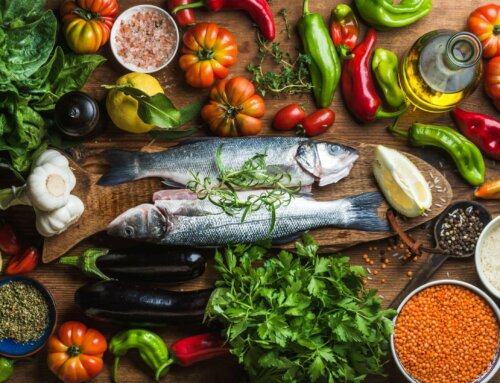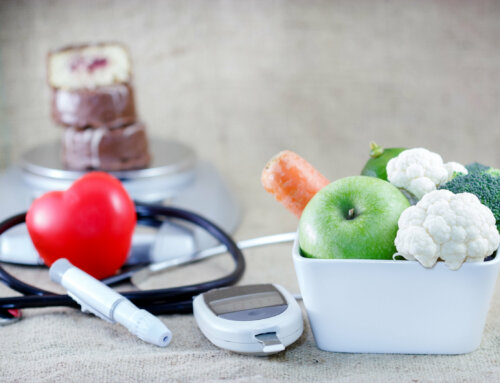A well-balanced diet is a top priority for people with diabetes. Eating healthy foods at the right times can help people avoid blood sugar fluctuations. Discover how to fight food cravings with diabetes for improved well-being.
- People with diabetes often work with a health care team that may include a dietitian, diabetes nurse educator and/or a nutritionist. The goal is to incorporate healthier foods into your daily meal plan including lean meats and fish, low-fat dairy, whole grains and fruit and vegetables. People with diabetes should have three meals daily and possibly 2-3 snacks depending on their insulin regimen. This minimizes the possibility of blood sugar spikes and helps ward off cravings. But there are still times when cravings need management before they become a serious problem.
- Be aware of the difference between hunger and appetite. When you are hungry, you physically need food. Appetite is more of a psychological urge. Hunger pangs make you want to eat something to get energized while cravings might make you want snack food. Check your blood sugar when you have these feelings to make sure it is not low. If it is a low, simply chewing a few glucose tablets may end the cravings or hunger pains. Be aware of emotional triggers that could make you want food for comfort rather than sustenance. Channel your energy into calling a friend or going for a walk.
- Keep in mind the rule of one. Sometimes it can be difficult to eat healthy foods all the time, especially if you were recently diagnosed with diabetes. Have one cookie or one bite of cake to satisfy your cravings without causing blood sugar spikes. Remember craving and binge eating are not the same thing. But an occasional small indulgence can help you ward off cravings the rest of the time. Try to stick to a 100 calorie threshold each day to avoid binge eating. Think about 100-calorie snack packs when a craving hits.
- Four hormones could be at the root of your cravings. Insulin spikes can make you feel hungry. Leptin puts a brake on your appetite but does not work when you eat too much flour, sugar and processed foods. Peptide YY, produced in your intestines, lets you know when you feel full. Ghrelin is the “hunger hormone” in your stomach that alerts you when it is time to eat. A few simple lifestyle habits can help you keep these hormones balanced and reduce cravings. Opt for quality fats such as seeds, nuts, olive oil and avocados.
- Binging usually happens at night. A key way to avoid these cravings is to never skip breakfast. Have breakfast with protein, such as eggs, to help balance your blood sugar. If you’re in a rush, grab a hard-cooked egg or a protein smoothie with ingredients such as chia seeds, unsweetened almond milk and blueberries. Eat breakfast, lunch and dinner with snacks. Have your meals at regular times so your body knows what to expect and maintain its balance. Stay away from sugary drinks, such as soda or lattes that can cause blood sugar spikes and cravings. Talk to your doctor about potential food sensitivities such as dairy or gluten.
- Minimize the stress in your life, which can produce a hormone caused cortisol that leads to belly fat and overeating. Try breathing exercises, yoga or tai-chi to reduce stress and stay balanced. Exercise at least five days a week for 30 minutes or more. This produces feel-good endorphins that also help reduce cravings.
- Often people wrongly believe they are hungry when they are really tired. Sleep for at least seven to eight hours each night. When you are sleep deprived, Ghrelin levels soar and PYY goes down. This makes you feel hungry. Getting enough sleep can ward off cravings and help you maintain a healthier weight. Losing just 7 percent of your total body weight can make a big difference in your overall health. Certain food supplements can also help cut cravings such as Omega-3 fats, vitamin D and chromium.
- Slow down when you eat and savor each bite. Eating too quickly can also lead to weight gain. You may need to steer clear of artificial sweeteners if they are leading you to sugary cravings. Eat plenty of vegetables to bulk up your diet and make you feel full without packing on the pounds. Serve them with Walden Farms dressings or dips that add flavor with no sugar or calories.
- If you are still trying to combat cravings, work with your diabetes health care team to tweak your daily diet and diabetes self-management plan. You may also want to talk to a counselor or therapist if you can’t fight the cravings.
Everyone gets food cravings, but there are ways to ward them off. Eat a well-balanced diet, exercise regularly and get plenty of sleep. Work with your health care team to create a diet and self-management plan that works for you.







Leave A Comment